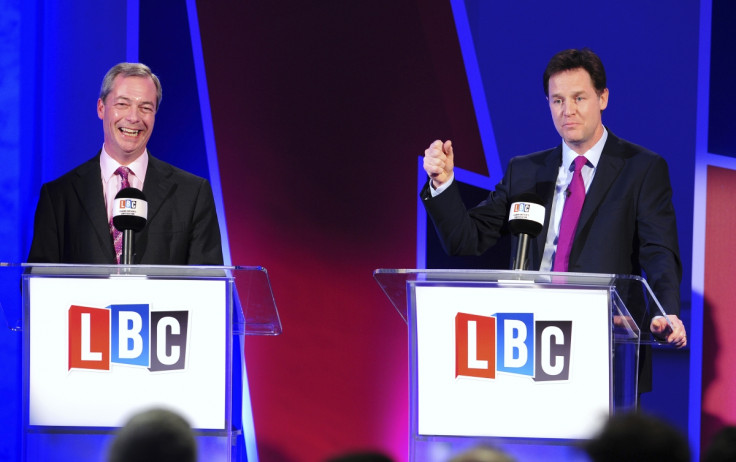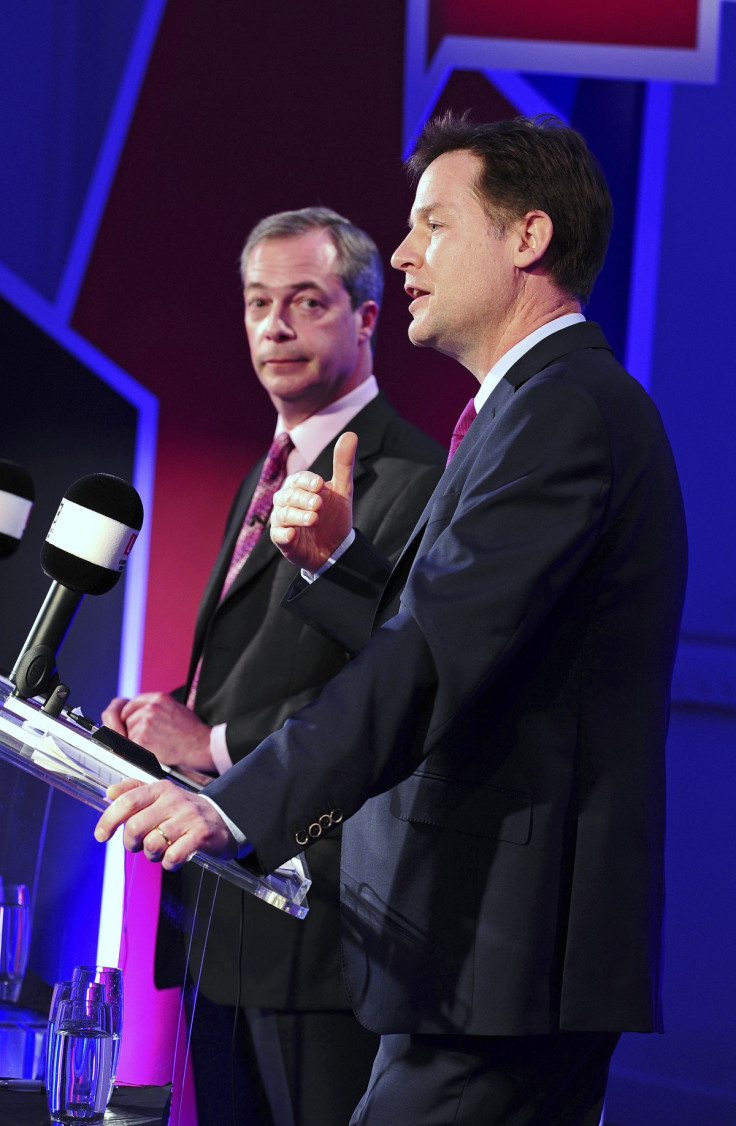Why Ukip's Farage and Lib Dem Clegg Were Both Wrong in EU Debate

Does the Liberal Democrat front man Nick Clegg ever just wonder to himself why he bothers as a politician?
If last night's European Union debate was anything to go by, then the answer is probably yes.
Unfortunately, Clegg's oratory skills resembled that of a hungover university fresher who had only just got into the debating society, and who had been handed a subject that he didn't quite understand, beyond what he'd gleaned from Cliff notes.
In this cack-handed fashion Clegg delivered even more support to Ukip's Nigel Farage on a silver platter.
Clegg seem unprepared, floundering and only delivered his message well when he wasn't made to rebuke statistical accusations over the EU's power over Britain.
Immediately after the toe-curling EU debate was over, YouGov's snap poll delivered the debate to Farage by 68% to 27%. Another poll by ICM/Guardian suggested 69% of people watching believed Ukip came out on top.
Though Farage, who undoubtedly has the wind in his sails right now, appeared to be dominant, his arguments are also fatuous.
He just had a clearer, louder, and seemingly, better prepared voice.
The pro-EU argument is actually a very strong one and there is an abundance of statistics and independent analysis out there to bolster it. Unfortunately, Clegg's stumbling mumbles failed to deliver these succinctly.
By contrast, the anti-EU debate is often supported by that camp's own "statistics"; here, again, Clegg missed a golden opportunity to pick out the inaccuracies and questionable sourcing for Farage's accusations.
Immigration
Political parties usually cherry-pick statistics that bolster their arguments but it's the job of the MPs in these debates to counteract this by verifying the credibility of sources, stats and so on.
Farage is a huge fan of citing "think tank" Migration Watch statistics - an organisation that has repeatedly been questioned over its selective calculations.
For example, Farage said "a house has to be built every seven minutes to deal with immigration," which was taken from this report.
Clegg could have fought fire with fire. Instead he seemed to fizzle out.
Farage also made the sweeping statement that immigration was only "good for the rich because of its cheaper nannies and cheaper chauffeurs and cheaper gardeners, but it's bad news for ordinary Britons" and that ordinary working Britons were the worst affected due to a lower wage economy.
Clegg could have easily hit back with a range of reports and statistics to emphasise how important immigration is to the development of our economy, what it contributes, and how it shapes our jobs market in a positive way.
Instead he whined about how we are not in the 1950s anymore.
Brussels Power
Prime Minister David Cameron and Chancellor George Osborne have repeatedly lent support to the pro-EU debate but said they will be do everything they can to claim back some of the power from Brussels.

One of the key reasons why the coalition decided to give the nation the chance to vote in the referendum, eventually, is because fears over seemingly increasing stronghold Brussels has over the UK.
However, Clegg made a rather large faux pas over EU laws and Farage jumped onto the mistake which provided a smokescreen to his own questionable statistical evidence.
"When I said yes to these debates I thought you would honestly make the pro-EU case," said Farage.
"By saying 7% of our laws are made in Brussels, you are wilfully lying to the British people about the extent to which we have given control of our country and our democracy and I am really shocked and surprised you would do that."
Actually, Farage was right (not just right-wing).
The legislative authority Brussels wields over the UK is a lot greater than Clegg suggested.
The EU accounted for 14% of our initiated regulation between 1997 and 2009. Between 1980 and 2009, the EU was responsible for 14% of acts put in place by our parliament.
Overall, the Brussels accounted for 53% of all regulations across the bloc.
Should We Stay or Should We Go?
We have at least three more years until Britain votes to either leave the EU or stay – that's if the Conservatives stay in power.
The UK general election is in 2015 and Britain's main opposition, Labour, has also jumped on the bandwagon and touted an EU referendum as a distinct possibility, if any new rules or treaties from Brussels seems to antagonise the nation further.
Undoubtedly, there will be more EU debates to come.
However, if the EU referendum does take place, the pro camp needs someone far better than Clegg to front its case because Farage is wrong but dangerously convincing.
© Copyright IBTimes 2025. All rights reserved.





















